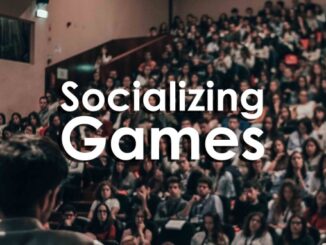
I have Attention Deficit Disorder (ADD), and what this means, for me, is that the majority of the time, I struggle with feelings of overwhelm. This may be triggered by something external – too much stimulation from sights, sounds (particularly, for me), even smells, or it may be internal. Typical internal overwhelm situations come from feeling scattered from trying to give my attention to too many things at once, a desire to move forward with too many projects at the same time, or even from having ‘too many’ ideas. This is a particularly difficult situation, because it is pleasurable to have exciting new ideas, but it is simultaneously unpleasant to feel overwhelmed trying to unravel which one to give attention to.
When I play games, however, there is a total shift in consciousness for me. This is about far more than the ‘fun’ that we all experience when playing a game we enjoy. Indeed, the same effect happens even if I’m not particularly liking a game.
The overwhelm vanishes. I lose awareness of the external stimuli that usually cause me problems, as my attention is totally taken by what is going in within the game. I no longer feel scattered, and feel completely able to ‘put aside’ all the ideas, or other thoughts that have been dividing my attention between them, until after the game is over.
Not a dearth, but a surfeit of attention
People with ADD are often seen as ‘not being able to sit still’, both figuratively and literally. But the problem is not one of lack of attention. The lived experience, at least for me, is the complete opposite. The issue is that attention is given totally to things that are currently interesting, to the exclusion of all else. If that is not what the person ‘should’ (often in the opinion of others) be paying attention to, their behaviour is characterised as ‘distracted’ or ‘inattentive’.

This article concerns my own experience, so I cannot speak for others, but when something takes my attention, that is total. It is not unusual to forget to eat, for example. This brings with it, respite from the overwhelm. Hyperfocus is, I believe, the natural state of joy, flow and happiness for someone with ADD. It happens in ‘ordinary’ life, sometimes, but with games, it is possible to have this state of mind, almost instantly, to order.
This tells me a number of things:
- Games are ‘interesting’, by design, in ways that everyday life (frequently) is not.
- It is possible to design experiences that can radically and instantly change someone’s mental functioning, including their perception of sensory stimuli, their immersion in activities and their emotional reaction to their own thinking.
- Being ‘interested’ is not necessarily the same thing as ‘liking’ an experience.
Games are ‘Interesting’
Games are designed to hold your attention in a way that real life isn’t. Even learning games where the primary purpose of the game is to instruct have the very important subsidiary purposing of keeping people entertained. Indeed, many people believe that this is the only reason for using games in learning, as opposed to other delivery methods – this characteristic of ‘Engagement’. This is not an opinion I agree with, at all, but that is another discussion, for another article.

This ‘interest’ is achieved in a number of ways, through pacing, through narrative, by allowing players to exercise autonomy and creativity, through novelty of experience, through other ‘gameful’ characteristic too numerous to list here.
And if this sound complex, it is. I believe that is in that complexity that ‘interesting’ emerges. For someone with ADD (well, me anyway) engaging with complexity triggers hyperfocus.
Experiences can be designed which give respite from ‘disorders’
The ‘Disorder’ designation of ADD is not something I accept about my experience, but the neurodiversity/disorder debate is something that is beyond the scope of this article. If a ‘designed’ experience, in this case a game, can give me respite from aspects of my life experiences which I find problematic, then this surely has implications for wider aspects of life beyond ‘leisure’ or even beyond ‘learning’.
You can be ‘interested’ without ‘liking’ something
Interest is often conflated with ‘liking’ something. And while it is true that I am generally interested in things that I like – the music of The Cramps, the creative output of the Dadaists, the films of Christopher Nolan, ‘interest’ is much broader than ‘liking’.
I didn’t enjoy spending four months day in, day out, building and re-building an incredibly complex spreadsheet (which probably should have been coded in C++ or similar) which modelled the marketing operations of a food manufacturer as a team game. I was, however, completely absorbed by it, such that I even dreamt about it.
When you think about all the things which people ‘don’t like’ about their lives and work, this again surely has wider implications for how designed experiences can utilise interest to improve our lot – even for people without the extreme attention issues of ADD.
Board Games vs Video Games
Personally, this effect is much more pronounced for me when playing board games. That is not to say that I ‘don’t like’ video games, or that I do not achieve a somewhat still mind when playing them. But there are pronounced differences. It’s true that I frequently have to play video games with the sound turned down (thereby often missing cues which might inform how I play), and that I do struggle with video games that require high levels of dexterity, to for example, achieve a particular manoeuvre. But the differences, for me, go way beyond these superficial distinctions. There is something ‘missing’ from the video game experience, which means that I do not get the same calming and quieting effect when I play.
I am sure that there are those who will have taken a much more academic approach to exploring this, but anecdotally, from my own lived experience, I have come to believe that there are two mani reasons for this. The first is the difference in the way in which you enter the ‘Magic Circle’ in a tabletop game versus the way it happens with a video game. The second, which I have already mentioned, is complexity.

The Magic Circle
The ‘Magic Circle’ of games is the space we enter when we play. Entering it implies acceptance of the different rules which govern the world of the game. So, to some extent, the magic circle can be seen as a kind of social contract, an agreement between players, to cooperate or compete until the game is over.
In terms of the premise of this article, however, the magic circle mainly represents a boundary between two distinct states of consciousness.
I believe that the reason that the experience of entering the magic circle is so much more profound with tabletop games than with video games, is because most tabletop games require preparation and setup which video games very often do not.
Picking up a controller or switching on a console is not the same thing. The set up of a table top game might involve playing pieces being distributed or positioned, a board being laid out, or even constructed and players positioning themselves, taking on identities and evaluating their starting options.
All of this has a sense of ‘ritual’ about which may serve to more clearly mark the transition from the real world into the magic circle.
The power of ritual
Outside of games, there are other ‘magic circles’, other practices, which are characterised by altered states, and which almost without exception include rituals, both to mark and facilitate the transition from one state to another. These would include shamanic practices, types of meditation and ‘magic’ of various kinds.
It is notable, for me, that where video games do allow me to achieve the same effect as tabletop games, they do involve this element of ‘ritual’ and setup. These are usually online RPGs, where there is a need to create a character, equip them and make decisions about what first steps to take before commencing play.
It would appear that including ‘ritual’ as an aspect of designed experiences can make them even more potent as vehicles for effecting change.

Holding Complexity
Where ritual is a way of facilitating transition into a different state, complexity provides a route to maintaining it. It is where prolonged ‘interest’ emerges. Modern tabletop games often have considerable complexity, requiring players to plan strategically, anticipate the actions of others and events within the game world, manage resources, comprehend copious rulesets, and chain decisions and ‘moving parts’ into ‘engines’ to progress within the game.
This creates a totally absorbing experience where there is simply ‘no space’ for distraction – ‘engaging’ for a neurotypical person, but for someone with ADD a welcome respite from cognitive ‘noise’ until the experience is over.
Gameful design of life, work and learning
In life and work, we often seek to make life as ‘simple’ as possible, reducing complexity where we can, to increase productivity or efficiency.
Could it be that we are ‘boring’ ourselves by doing this – reducing the potential for finding ‘interest’ even in the most mundane aspects of work, life and learning. And if we can ‘design’ out interest, could we not also design it in.
The above just presents one small idea from the wider field of ‘gameful design’. There are many others. This is the concept of a ‘magic circle’ which features greater complexity than the ‘real world’ outside it. The entry into this magic circle should be marked and facilitated by some sort of ritual which clearly delineates transition.
What are the ideas that this sparks for you?
- James Bore – The Ransomeware Game - 13th February 2024
- Ipsodeckso – Risky Business - 23rd January 2024
- Review – Luma World Games - 15th December 2023





Very interesting. I think I sometimes suffer from 1) perfectionism and 2) disruptive change disorder.
The first is my focus on doing things the best that I can. Not unusual, but it sometimes causes procrastination and sometimes causes too much focus. My cure is to, “Just DO It!” which often means hit the publish button too quickly.
The Disruptive Change Disorder I think comes from using my Square Wheels metaphor too often and the problem of seeing Square Wheels everywhere. That drives the cognitive dissonance that makes me look for those Round Wheels. This, my tendency to disrupt normal processes because there ARE better ways to do things. I guess that is my preferred way of dealing with complexity, in that I look for a few good disruptive ideas and then use that as a focus.
My games and tools all tend to support my alignment to those choices. The focus is to make the interactive aspect of the game seamless but to generate sufficient cognitive dissonance among the players that they focus on discussing things they could do better to improve their workplaces (to mine more gold) and to disrupt the general competition that exists to focus more on collaboration between players and between teams.
Those things tend to keep me driving forward at age 74, that and the desire to leave a great legacy on workplaces worldwide.
Have FUN out There, but keep looking for things to do more better faster.